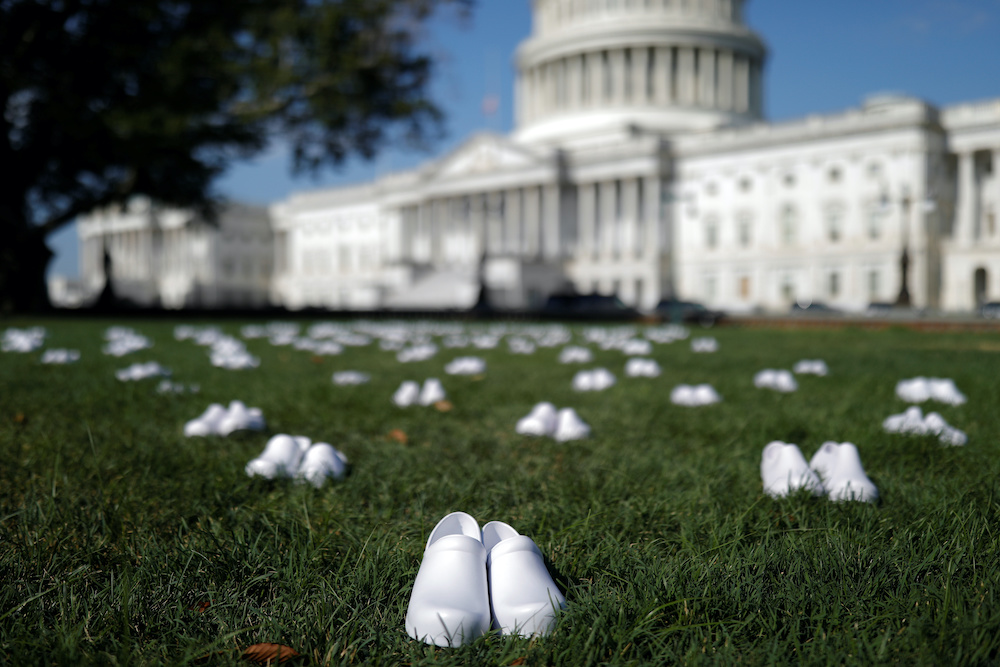
White shoes are displayed near the U.S. Capitol in Washington, D.C., July 21. The display honors those who have died during the coronavirus pandemic. (CNS photo/Tom Brenner, Reuters)
This year will go down as one of the worst in American history. Millions have contracted the coronavirus, and with the current rate of spread we can expect nearly 300,000 to die. Millions more are unemployed and falling into poverty. Schools are closed. Videos have exposed police brutality, which has brought people to the streets.
But crises provide opportunities and grace. They challenge us to rise to the occasion, think creatively and change the way we live and work. World War II changed American society profoundly, bringing women into the workforce and accelerating developments in aviation, electronics and communications. Among the Cold War's technological legacies is the internet and the revolution it wrought.
Despite the terrible impact of COVID-19 on us, in what ways could the coronavirus change work, families and church for the better? Where are the opportunities and graces?
In the workplace, the coronavirus has already challenged the idea that all white-collar workers need to be in an office. Productivity has been sustained, and sometimes improved, as Americans shifted to working from home. Workers spend less time and money commuting. Though school closings mean more child care responsibilities, flexible work schedules mean more time with loved ones. There may be advantages for workers with disabilities.
If remote work becomes a permanent feature of American life, small towns and rural areas could also benefit as talented locals stay home and newcomers looking for more room and lower costs come from urban areas, diversifying their economies and populations.
All of this could result in a better quality of life for people who can work from home as well as a reduction in carbon emissions.
Advertisement
The pandemic has also opened our eyes to the importance of blue-collar workers who cannot work from home. Essential workers include not just doctors and nurses but many who are ignored, disrespected and poorly paid: workers in grocery stores, mass transit, sanitation, cleaning, maintenance and agriculture. Pope Francis teaches that an economy is measured not by its gross domestic product but by how it treats people. COVID-19 has shown us that these undervalued workers deserve better wages and working conditions.
Our understanding of the role of government is also being affected by the pandemic, as the impact of underfunding public health departments, public hospitals and emergency stockpiles has become evident. It has made clear that the market cannot solve every problem. Cries of "socialism" sound hollow to people who fear their families will get sick, go hungry and become homeless.
Government is an essential instrument in working for the common good, according to Catholic social teaching. If the pandemic shows voters how essential government is, that may make political space for government efforts for the common good.
Public policy on health care and unemployment will help determine if families, particularly those who have a sick family member, will be made stronger or will be broken. What may look like economic questions are actually family questions: We know, for instance, that increases in unemployment correlate with increases in spousal and child abuse.
Everyday family life is seriously affected by the coronavirus as we experience something akin to a months-long snow day. Being confined to home can be an opportunity to bond more deeply with those we love, but this requires conscious efforts to nourish family relationships. Listening is essential. Good communication and common activities build a group of individuals living under the same roof into living cells that nourish one another. If we learn these skills now, they will continue to nourish family life after the pandemic.
While Catholics cannot celebrate the Eucharist at home, they can celebrate their own Liturgy of the Word. Reading and discussing the Sunday Scripture readings is a great way for Catholic families to grow together in their faith. It may be time to revive old devotions such as the family rosary and grace before meals. These are good practices that should continue after the pandemic.
Being Christian does not happen just at home and in a church building. Pope Benedict XVI described the church's charity work as equal in importance to the sacraments and the Word, and Catholics mourning the loss of the sacraments can and must still live lives of compassion and love. Catholic charities and social services have had to step up to meet the fallout from the epidemic as the number needing help escalates.
We also need to learn new ways to sustain the community when we cannot congregate in parish meeting rooms and halls. In the past, parish priests and staff have protested that they had no time to develop a parish social media presence; today they have no choice.
For example, parishes can use Facebook or other social media to create small Christian communities to reflect and pray over the Sunday Scriptures even if the Eucharist is not available. Book clubs can do the same. Spiritual direction and conferences can be conducted over Zoom.
Although people cannot go to church, the pandemic shutdown has given people more time to reflect on their lives. Fr. Pat Conroy, chaplain to the House of Representatives, reports that he has longer and deeper conversations over the phone with members of Congress because the virus has curtailed their work on the Hill and the campaign trail.
The coronavirus is wreaking havoc on the United States, but it also is giving us opportunities that we should not miss. Grace is always present, even in the worst of situations. God is present in the worst of times.
[Jesuit Fr. Thomas Reese is a columnist for Religion News Service and author of Inside the Vatican: The Politics and Organization of the Catholic Church.]
Editor's note: You can sign up to receive an email every time a new Signs of the Times column is posted. Sign up here.




